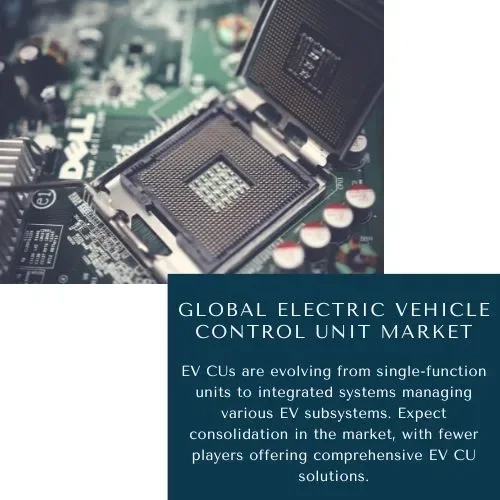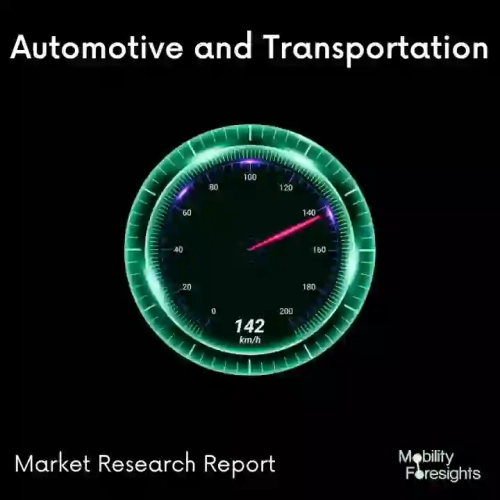ELECTRIC VEHICLE CONTROL UNIT MARKET
KEY FINDINGS
- The global electric vehicle control unit market is on a fast track to exponential growth, fueled by the surging demand for electric vehicles (EVs) and the increasing complexity of their electrical systems.
- Stringent environmental regulations, government incentives, and growing consumer preference for sustainable transportation are driving the global EV market. This translates to a direct increase in demand for EV CUs, the brains behind these vehicles.
- Next-generation EVs will boast longer ranges, faster charging times, and more autonomous driving features. These advancements necessitate more sophisticated EV CUs capable of handling complex powertrain management, battery optimization, and integration with various sensors and actuators.
- EV manufacturers are constantly striving to improve vehicle efficiency and performance. EV CUs play a crucial role in optimizing energy consumption, maximizing battery range, and delivering a smooth driving experience.
- EV CUs are evolving from single-function units to integrated systems managing various EV subsystems. Expect consolidation in the market, with fewer players offering comprehensive EV CU solutions.
- Software will play an increasingly critical role in EV CU functionality. The rise of software-defined control units (SDCU) allows for greater flexibility, faster updates, and easier customization of EV performance.
- As EV CUs become more complex and interconnected, cybersecurity threats become a growing concern. Manufacturers will need to prioritize robust security features within EV CU designs to protect against potential hacking attempts.
- The industry is likely to see increased efforts towards standardization of EV CU interfaces and communication protocols. This will improve compatibility, simplify development, and foster innovation within the market.
- SiC semiconductors offer superior heat tolerance and efficiency compared to traditional silicon. Expect wider adoption of SiC in EV CUs to enable faster charging, longer range, and more compact unit designs.
- Asia Pacific is expected to be the dominant market due to rapid EV adoption in China, government support for EV development, and a strong presence of leading EV CU manufacturers.
- Strict emission regulations and a growing focus on sustainability are driving EV sales in Europe, making it a lucrative market for EV CU suppliers.
- While lagging behind Asia in EV adoption, North America presents significant growth potential with increasing consumer interest in EVs and government initiatives promoting clean transportation.
ELECTRIC VEHICLE CONTROL UNIT MARKET OVERVIEW
The global electric vehicle control unit market is on a fast-paced ride towards exponential growth. Fueled by the surging popularity of electric vehicles (EVs) and their ever-more complex electrical systems, EV CUs are the brains behind these clean machines. Stringent environmental regulations and consumer preference for sustainable transportation are key drivers, while advancements in EV technology like extended range and autonomous features necessitate even more sophisticated EV CUs.

The future holds integration and software-defined control units for optimized performance, alongside growing concerns about cybersecurity. Standardization efforts and the rise of efficient Silicon Carbide technology are expected to revolutionize the industry. While cost pressures and supply chain challenges pose hurdles, the market is expected to be dominated by Asia Pacific due to its booming EV sector.
With strategic planning to address constraints and capitalize on target markets like Europe and North America, this market overview highlights the immense potential of EV CUs to power the future of clean transportation.
ELECTRIC VEHICLE CONTROL UNIT MARKET INTRODUCTION
Various electrical and electronic components of an electric vehicle (EV) are managed and coordinated by a central computer system known as the electric vehicle ECU (Electronic Control Unit). To maintain optimum operation and maximise performance, it is in charge of regulating and observing several systems within the car.
The ECU serves as the brain of the electric car, analysing data from sensors and making choices in accordance with programming and predetermined algorithms.
The ECU for electric vehicles often carries out a number of tasks, such as:
- Cell voltage, temperature, and the general health of the battery pack are all monitored and managed by the battery management system (BMS). It regulates the processes of charging and discharging, provides security, and prolongs battery life.
- Controlling the electric motor(s), inverter, and power electronics is referred to as powertrain control. It provides smooth acceleration, regenerative braking, and energy recuperation while controlling motor speed, torque, and efficiency.
- Controlling the temperature of various EV parts, including the battery pack, motor, and power electronics, is known as thermal management. It promotes efficiency, minimizes overheating, and aids in maintaining ideal operating conditions.
- Vehicle Safety and Control: controlling a variety of vehicle functions, including the ABS, traction control, and stability control. It guarantees the carâs stability and safety as it accelerates, slows down, and turns.
- Controlling the charging process includes coordinating with charging stations, setting charging rates, and keeping track of the batteryâs condition while it charges.
- Connectivity and communication: Enabling interaction between various vehicle systems, sensors, and external gadgets. It makes connectivity possible for things like infotainment systems, GPS, and remote control.
- Through coordination of the numerous electrical and electronic systems, the Electric Vehicle ECU is essential in guaranteeing the effective and secure functioning of electric vehicles. It makes it possible to use more sophisticated features and improves the overall effectiveness, usability, and range of electric vehicles.
ELECTRIC VEHICLE CONTROL UNIT MARKET SIZE AND FORECAST

The Global Electric Vehicle ECU market accounted for $XX Billion in 2023 and is anticipated to reach $XX Billion by 2030, registering a CAGR of XX% from 2024 to 2030.
ELECTRIC VEHICLE CONTROL UNIT MARKET TECHNOLOGICAL TRENDS
- Merging for Efficiency:The trend is towards integrated systems that manage a multitude of EV subsystems. Imagine one unit overseeing everything from battery management and powertrain control to thermal regulation and charging functions. This integrated approach simplifies vehicle design, reduces complexity, and optimizes overall efficiency.
- The Rise of Software-Defined Control Units (SDCU): EV CUs are becoming increasingly software-driven. Imagine SDCU technology, where software acts as the brains of the operation. This allows for greater flexibility and customization. Software updates can unlock new features, improve performance over time, and enable faster adaptation to evolving needs without hardware modifications.
- Cybersecurity Fortifies Defenses: As EV CUs become more sophisticated and interconnected, cybersecurity threats become a growing concern. Just like a knight needs armor, robust security features are being built into EV CU designs. This includes encryption protocols, intrusion detection systems, and secure communication channels to safeguard against potential hacking attempts and protect critical vehicle data.
- Standardization for a Smoother Ride: Imagine a world where EV components seamlessly work together, regardless of manufacturer. This is the goal of standardization efforts in the EV CU market. Standardized interfaces and communication protocols will ensure compatibility between different EV CU systems and components. This fosters innovation, simplifies development processes, and benefits the industry as a whole.
- Silicon Carbide (SiC) Charges Forward: Powering Up Efficiency: Traditional silicon semiconductors are giving way to a new champion: Silicon Carbide (SiC). SiC offers superior heat tolerance and efficiency compared to silicon. This translates to faster charging times, extended range for EVs, and the potential for more compact EV CU designs due to reduced heat generation. The adoption of SiC technology is poised to be a game-changer for the EV CU market.
ELECTRIC VEHICLE CONTROL UNIT MARKET NEW PRODUCT LAUNCH
DCU3000, a vehicle power domain controller launched by Tianjin Yidingfeng Powertrain, integrates control functions such as VCU, BMS, and thermal management. This product complies with AUTOSAR 4.2 standard, and supports RTE and non-RTE interfaces at the application layer.
It also supports such functions as UDS fault diagnosis and 100M vehicle Ethernet communication. It allows for customization of bootloader brushing process and parameters, and supports FOTA backup and refresh function. It is suitable for battery electric vehicles and hybrid electric vehicles with 12V power supply systems
SemiDrive introduced SCCA 2.0, its future-oriented central computing architecture, to provide underlying references for OEMs. This architecture contains six core units which are interconnected via 10G/1Gbps high-performance vehicle Ethernet, and adopts redundancy architecture, ensuring low-latency high-traffic data exchange and security.
Wherein, the intelligent vehicle control unit (VHPC) is a chassis domain + power domain integrated controller, mainly responsible for chassis and power integration and intelligent control. In terms of hardware, the VHPC uses SemiDriveâs G9 processor and E3 MCU, with total CPU compute up to 300 DMIPS.
In the evolution of automotive E/E architecture, Jingwei HiRain has designed and developed products based on future mainstream centralized architecture. In the 2023 New Product Launch, it announced the new products: Central Computing Platform (CCP) and Zone Control Unit (ZCU).
ELECTRIC VEHICLE CONTROL UNIT MARKET SEGMENTATION
By Function
- Motor Control Unit (MCU)
- Battery Management Unit (BMU)
- Vehicle Control Unit (VCU)
- Other Functional Units
By Vehicle Type
- Passenger Cars (BEVs & PHEVs)
- Commercial Vehicles (Electric Buses & Trucks)
- Two-Wheeled Electric Vehicles (E-bikes & E-scooters)
By Level of Automation
- Conventional EV CUs
- EV CUs for Autonomous Vehicles
By Geography
- North America
- Europe
- China
- Asia Ex China
- ROW
ELECTRIC VEHICLE CONTROL UNIT MARKET COMPANY PROFILES
- Continental AG
- Bosch GmbH
- Aptiv PLC
- Hitachi Automotive Systems Ltd.
- Infineon Technologies AG
- Mitsubishi Electric Corporation
- DENSO Corporation
- ZF Friedrichshafen AG
- Texas Instruments Incorporated
- Lear Corporation
ELECTRIC VEHICLE CONTROL UNIT MARKETREPORT WILL ANSWER FOLLOWING QUESTIONS
- Cost breakup of a Global Electric Vehicle ECU and key vendor selection criteria
- Market share of Global Electric Vehicle Control Unit market manufacturers and their upcoming products
- Cost advantage for OEMs who manufacture Global Electric Vehicle ECU in-house
- key predictions for next 5 years in Global Electric Vehicle ECU market
- Average B-2-B Electric Vehicle Control Unit market price in all segments
- Latest trends in Electric Vehicle ECU market, by every market segment
- The market size (both volume and value) of the Electric Vehicle ECU market in 2024-2030 and every year in between?
- Production breakup of Electric Vehicle Control Unit market, by suppliers and their OEM relationship
- What are the key technological advancements driving the growth of the global electric vehicle control unit (EVCU) market?
- How do electric vehicle control units differ from traditional engine control units (ECUs) in internal combustion engine vehicles?
- What are the main functions and components of electric vehicle control units, and how do they contribute to the operation and performance of electric vehicles?
- What are the main types of electric vehicle control units available in the market, and how do they differ in terms of functionality and compatibility with different electric vehicle architectures?
- How do regulatory standards and government incentives impact the adoption and development of electric vehicle control units in different regions?
- What are the major challenges and constraints faced by manufacturers and suppliers of electric vehicle control units, such as cost, complexity, and interoperability?
- How do electric vehicle control units integrate with other vehicle systems, such as battery management systems, motor controllers, and onboard charging systems?
- What are the emerging trends in electric vehicle control unit technology, such as artificial intelligence, cybersecurity, and over-the-air updates?
- How do competitive dynamics, including mergers, acquisitions, and partnerships, shape the global electric vehicle control unit market landscape?
- How do electric vehicle OEMs and Tier-1 suppliers collaborate with EVCU manufacturers and technology providers to develop and integrate electric vehicle control systems into their vehicle platforms?



